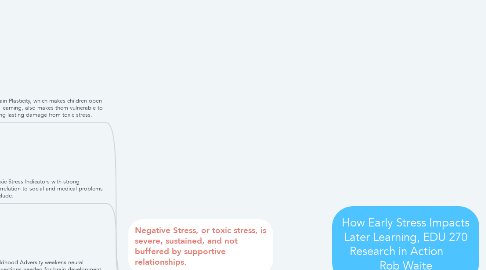How Early Stress Impacts Later Learning, EDU 270 Research in Action Rob Waite
by Rob Waite


1. Negative Stress, or toxic stress, is severe, sustained, and not buffered by supportive relationships.
1.1. Brain Plasticity, which makes children open to learning, also makes them vulnerable to long lasting damage from toxic stress.
1.2. Toxic Stress Indicators with strong correlation to social and medical problems include:
1.2.1. High Mobility
1.2.2. Homelessness
1.2.3. Hunger and Food Insecurity
1.2.4. Jailed Parent
1.2.5. Absent Parent
1.2.6. Domestic Violence
1.2.7. Drug Abuse
1.3. Childhood Adversity weakens neural connections needed for brain development.
1.4. Over Time, good and bad connections stabilize, you can't go back and rewire, you have to adapt.
1.5. Federal and State programs focused on academic remediation and nutrition are not sufficient to help children overwhelmed by toxic stress.
1.5.1. Teachers can develop supportive relationships with students and parents
1.5.2. Researchers are starting to consider new medical and cognitive interventions to help children cope with toxic stress.
1.5.3. Our culture is not responsive to this issue, the message to people with toxic stress is "suck it up".

